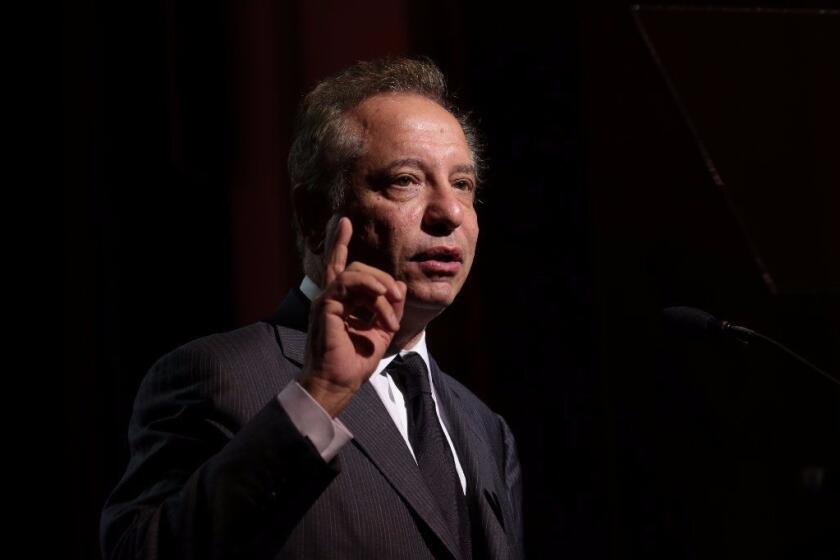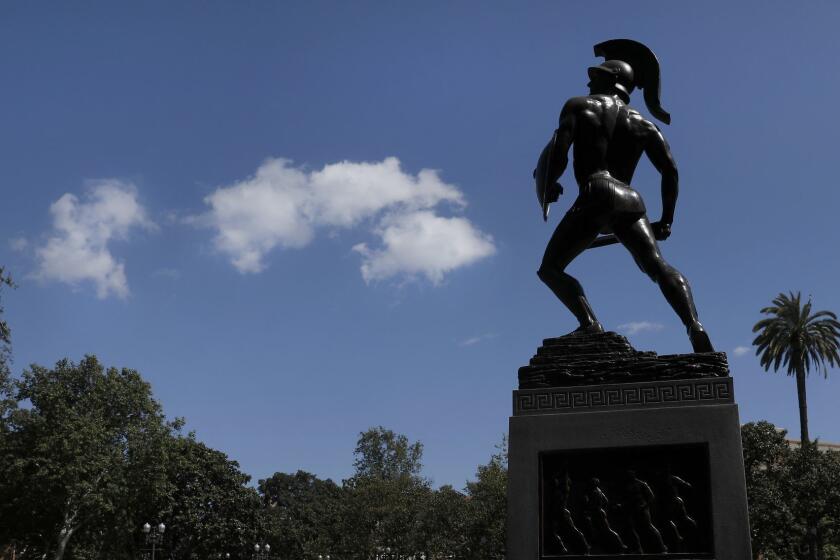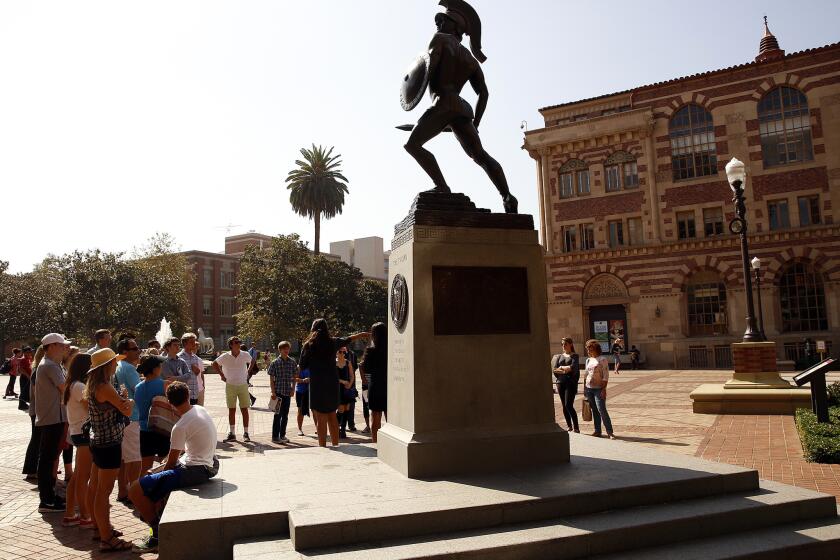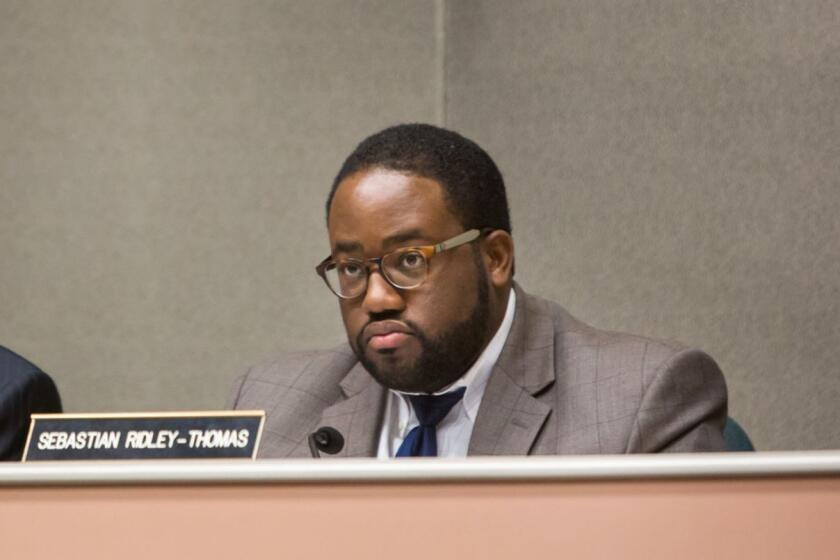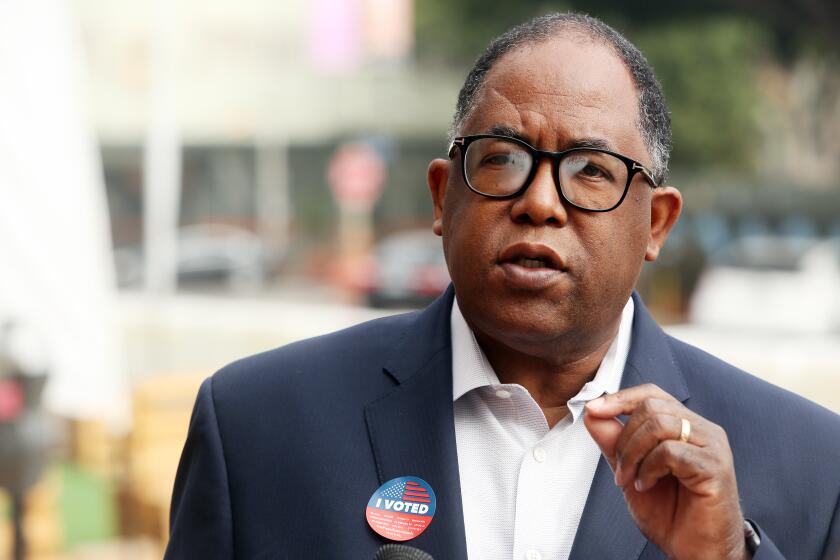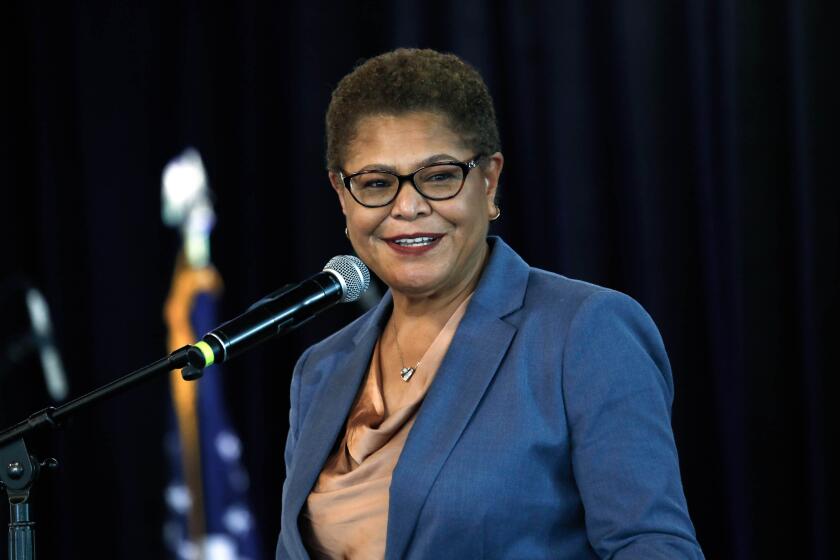USC was in a free fall. Then it turned to Rick Caruso
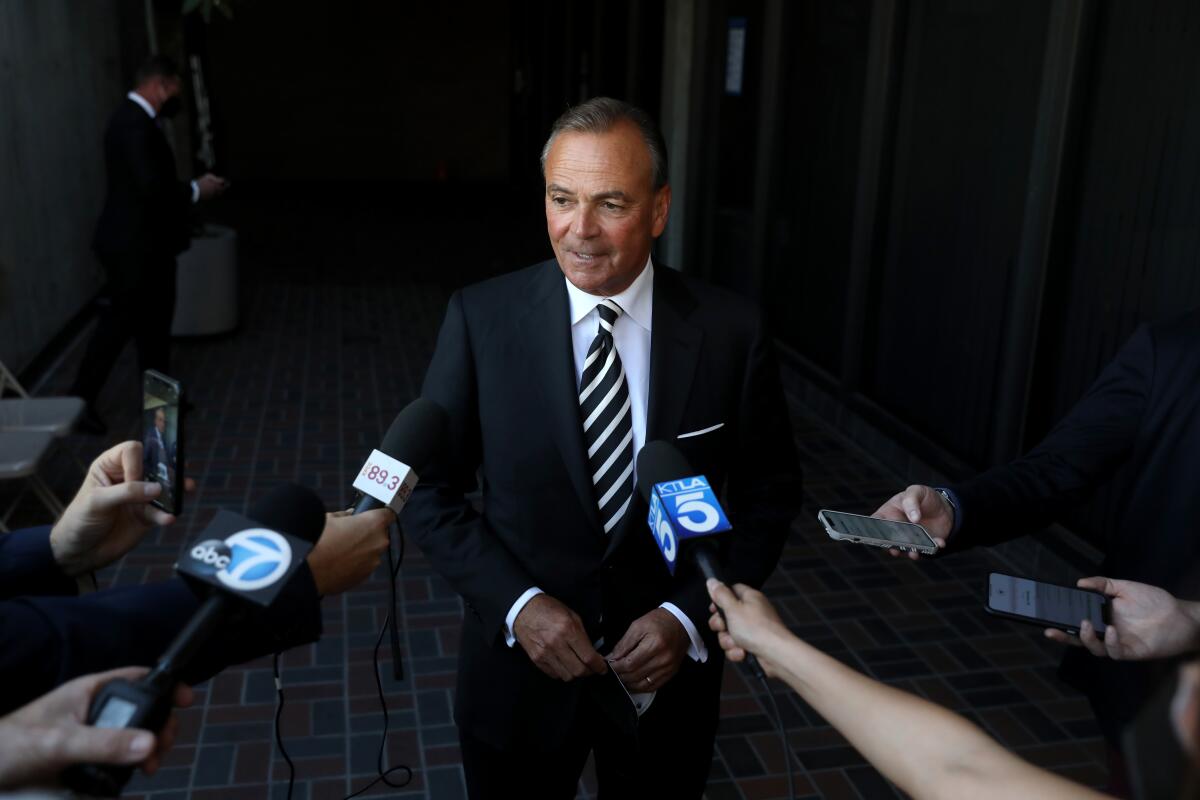
- Share via
At the lowest point in its history, the University of Southern California turned to Rick Caruso.
It was 2018 and USC was reeling from revelations about a campus gynecologist. Hundreds of students and alumnae were lining up sexual abuse suits that would eventually cost the university more than $1 billion. The once-docile faculty was demanding the president’s resignation, and the LAPD and the U.S. Department of Education were mounting investigations.
Embattled President C.L. Max Nikias summoned Caruso, a real estate developer, alumnus and university trustee, to a May meeting and laid out more bad news: The man in line to head the board, a low-profile Silicon Valley venture capitalist, was not suited to lead through the crisis.
“He needed some stability,” recalled Caruso, who had navigated scandal as an L.A. police commissioner. “It was getting out of control.”
Caruso stepped into the volunteer post and quickly transformed it into a full-time position that made him at times over the last four years the de facto chief executive of USC, a multibillion-dollar healthcare and education enterprise that is the city’s largest private employer.
Now running for mayor, Caruso is inviting voters to look closely at that most recent entry on his resume. His campaign has presented him as ready to fix L.A.’s crime, homelessness and corruption the way he “cleaned up the messes at USC.”
There is broad agreement on campus that the university is in a better place than when Caruso took over. In interviews with administrators, faculty, students, trustees and alumni, many credited him with the ouster of the polarizing Nikias and the compensation of former patients of Dr. George Tyndall, the largest sex abuse settlement in higher education history. They also lauded Caruso for his role in installing USC’s first female president, Carol Folt, and its new star football coach and reforming a governing board of fellow billionaires and power players in the face of personal attacks.
“He was willing to take the bullets and the darts to do the right thing,” said trustee Suzanne Nora Johnson, a retired Goldman Sachs executive. “I know very few people in public and private life who are as truly courageous.”
Others said they were disappointed by a lack of transparency at the university, including keeping private the internal reports about misconduct. Some professors also bemoaned a “top-down” approach that they said discounted the views of academics and students and relied on management consultants.
“I can understand why coming from his background as an accomplished mall developer guy, he would see running things well as the solution but a university is not a shopping mall,” said cinematic arts professor Howard Rodman, president of the USC chapter of the American Assn. of University Professors. “Good management is not a goal in itself.”
After he took over, Caruso became the first board chair in recent history to set up an office near the president’s suite in Bovard Hall, and he worked there with a chief of staff hired from Caltech.
Elizabeth Daley, the longest-serving USC dean who leads the School of Cinematic Arts, said she was relieved to see Caruso taking a hands-on approach given the “figurehead” role that trustees often played.
“You felt like the right person was in charge,” Daley said. Of his “24/7 availability” in those days, she recalled thinking, “The man doesn’t need this — he could easily live a life of luxury.”
By that point, USC had become synonymous with corruption. There was the medical school dean who used methamphetamine and partied with addicts in his campus office, and his replacement who had to step down after a sexual harassment accusation emerged. The athletic department produced more scandals than national championships: students on the take, a football coach intoxicated at a pep rally, another one fired on an airport tarmac, an athletic director collecting money from a children’s nonprofit.
In USC’s lecture halls, labs and executive offices, Dr. Carmen A. Puliafito was a towering figure.
The Daily Trojan staff hung a “days-since-scandal” counter on the newsroom wall — and never got past eight, said alumnus Tomás Mier, the paper’s former editor-in-chief. “It became a good training ground as a journalist, but it was really difficult to be a student,” Mier said.
The university was governed on paper by the trustees, but the board of about 60 influential business leaders and donors exercised little real oversight. Whatever disturbing headlines came, Nikias emphasized USC’s phenomenal strides in academics and fundraising, trustees and university officials said.
Caruso had been one of those who accepted Nikias’ rose-tinted view. A 1980 graduate and donor, he was elected to the board in 2007 and served for a period on its executive committee, ostensibly the most powerful group of trustees.
“It was a very passive board,” Caruso acknowledged in an interview. “Shame on all of us for not being more critical.”
In March 2018, he and other members of the executive committee were privately briefed on allegations against Tyndall, who had been quietly forced out of the student health clinic two years earlier following decades of complaints from women. Caruso said that he was shaken and recommended an independent investigation, something he said university lawyers urged against.
It was after Tyndall’s troubled history became public in The Times two months later that Nikias asked Caruso to become chair. The president had publicly agreed to step down, but behind closed doors he and many trustees anticipated that he would weather the storm and remain in office. Nikias declined to comment.
Caruso said Nikias initially counted him as one of these “loyalist” trustees, but that quickly changed as details about Tyndall emerged.
“We needed to look forward,” Caruso said.
His own daughter, Gianna, was among thousands of first-year students set to arrive in August and he felt it would be “a nightmare” for Nikias to welcome them and their parents amid protests about a rogue gynecologist.
Caruso met one-on-one with other trustees to try to convince them that the Nikias era had to end and that it was worth USC opening its coffers to hasten his exit. William Tierney, a professor emeritus of education, recalled Caruso confiding in him, “‘If Max steps down, it’s going to cost us.’ And I knew what he meant.”
The lucrative severance package Nikias negotiated has never been fully disclosed. Public tax filings reveal it has included millions of dollars in compensation and a loan for a $4.1-million house in Manhattan Beach.
Tax filings show that USC then-President C.L. Max Nikias received millions as well as a $3-million housing loan when he stepped down amid scandal.
It was not Caruso’s last clash with trustees loyal to the old guard. When interim President Wanda Austin forced out the popular business school dean later that year over the handling of harassment and discrimination claims, other billionaire trustees, including entrepreneur Ming Hsieh and Lakers’ co-owner and developer Ed Roski, wanted Caruso to intervene. He refused.
The dispute at one trustees meeting grew so heated that security was called and Hsieh ejected — a move that Roski later suggested was motivated by racism on Caruso’s part. Opponents reportedly scuttled the developer’s application to join L.A. Country Club.
The discontent waned after Caruso helped lure an impressive new leader for USC’s business program: the dean of the vaunted Wharton School of Business.
Months of tension and turmoil on USC’s Board of Trustees prompted an emergency meeting Wednesday at the campus, with the university’s leadership a top item for discussion.
Financier Lloyd Greif, a donor who led the attempt to keep Jim Ellis as business school dean, said he did not talk to Caruso for years afterward and still strongly disagreed with him on that issue. He credited Caruso, though, for his resolute leadership.
“Rightly or wrongly — and you know my view on it — it was a tough decision,” he said.
Under Caruso’s tenure, the sprawling, quarrelsome board was whittled down from more than 57 members to 40, and by the end of this year, 35. Its bylaws were rewritten to set term limits and its workings were made more public. The membership of the executive committee, kept secret during Nikias’ administration, is now listed on the university website.
“We transformed our board to ensure these problems of the past aren’t repeated,” said trustee David Bohnett, a tech investor who helped lead the overhaul of the board to provide more active oversight.
The faculty campaigned for the board changes, but some felt used when the reforms did not include voting seats for them or the student body. “Once the coup had been successful, the degree of communication dropped precipitously, which could lead one to think we had served our purpose and now it was back to business as usual,” said communications professor Larry Gross.
Some professors were disappointed that the university did not dip into the endowment to maintain payments to faculty retirement accounts during the pandemic. Caruso’s use of the controversial consulting firm McKinsey & Co., which has advised Enron, an opioid manufacturer and other problematic clients, also drew objections
To get input on the selection of new president, Caruso introduced a strategy that had proved successful in mollifying neighbors about his mall projects: listening sessions. Groups of trustees sat for hours as students, faculty, alumni and staff aired grievances and hopes for what the next president would embody.
The board chose Carol Folt, the chancellor of University of North Carolina at Chapel Hill, pleasing those who wanted a visible change from USC’s “old boys club” past. Folt declined an interview citing a policy of not taking sides in elections. In a February letter to alumni and students, she wrote that Caruso’s “vision and faith put USC on the path to restoring trust in and integrity across the institution.”
Shortly before Folt was named president, federal prosecutors announced the indictment of dozens of wealthy parents in a nationwide scheme to buy admission to USC and other universities.
Lawyers for parents charged in the case are seeking documents from USC that they believe will show the role donations play in admissions decisions.
Though the conduct alleged in the “Varsity Blues” case predated Caruso’s time as chair, he was drawn into the scandal when the daughter of one couple charged, actress Lori Loughlin and her husband, Mossimo Giannulli, was with the developer’s daughter on his yacht in the Bahamas at the time of her parents’ arrest.
Asked about the situation, Caruso said he didn’t want to violate his daughter’s privacy, but said, “I did nothing wrong. My daughter did nothing wrong.”
Transparency was one of Caruso’s promises when he began his term. Less than a month into his tenure, that commitment was tested when a whistleblower at USC’s social work school questioned the routing of a donation by the dean, Marilyn Flynn, to a nonprofit run by the son of then-Supervisor Mark Ridley-Thomas.
When state Assemblyman Sebastian Ridley-Thomas resigned suddenly in December, it marked an abrupt halt to a promising political career.
USC reported the transfer to the U.S. attorney’s office, and Caruso publicly announced the move in a letter to the community. Last year, a grand jury indicted Flynn and Ridley-Thomas; both have pleaded not guilty to charges of conspiracy and bribery.
The longer Caruso stayed in power, though, the less interested he seemed to be in airing the university’s dirty laundry. Early in his tenure, he said he planned to release internal reports about former medical school dean, Dr. Carmen Puliafito, and Tyndall, the gynecologist.
Full coverage of Mark Ridley-Thomas, his son and the USC School of Social Work.
The Puliafito report remains confidential. Questioned recently, Caruso said it was Nikias who decided to keep the report secret. He did not explain why that decision could not be reversed.
As to the Tyndall report, Caruso contended that there was nothing written to release because the law firm hired to investigate had briefed trustees orally. “It was a complex, terrible case. We did the right thing. And now to release information with particular details of what happened would just be harmful,” he said. USC ultimately agreed to pay more than $1.1 billion to Tyndall’s former patients.
Undergraduate Sydney Brown, president of the Trojan Democrats, criticized what she said was a pattern by Caruso and other university leaders of announcing investigations but not disclosing the findings.
“It all ties into this notion that USC is incapable of being transparent and holding wrongdoers accountable,” Brown said. The organization she leads has endorsed Caruso rival Rep. Karen Bass, a USC alum.
Rep. Karen Bass received a full-tuition scholarship for graduate study at USC’s School of Social Work, worth $95,000.
A vast protective order in the gynecologist case remains in place, shielding from the public the testimony of Caruso, university administrators, clinic nurses, former patients who alleged abuse and Tyndall himself.
Caruso said he had no objection to making his deposition transcript public: “I have nothing to hide.”
In the wake of the Tyndall scandal, USC hired a raft of new administrators to oversee ethics and increase the services for sexual assault victims.
Still, when the university received at least five reports about alleged drugging and assault last fall at a fraternity, it took three weeks to alert the student body. In that time, another student reported she was sexually assaulted by a member of the same fraternity.
Though the president acknowledged a “troubling delay in acting on this information,” Caruso maintained that “swift action was taken,” adding, “All fraternities were shut down in terms of social events.”
One rival in the mayoral race has invoked USC’s sexual assault record to say Caruso is unfit, citing a 2019 survey — taken about nine months after Caruso took over as chair — in which one-third of USC women had reported being sexually assaulted during their college years.
“If he couldn’t keep the women of USC safe, how is he going to keep the women in the city of Los Angeles safe?” mayoral candidate and City Atty. Mike Feuer said at a recent debate. Caruso called Feuer’s attack “grotesque.”
Alexis Areias, president of the Undergraduate Student Government, said the initial response to fraternity assault reports deserved criticism. But she said she had studied the numbers Feuer cited, and she did not think it was fair to lay all the blame on Caruso.
“I do think he inherited a lot of those statistics and those atrocities that occurred,” Areias said. “I don’t think a culture shift can occur overnight.”
For certain alumni, Caruso’s most important contribution to USC was lending his private plane to whisk the new football coach Lincoln Riley from Oklahoma to L.A. Caruso was one of four people on campus last fall who knew the Trojans were circling the Sooners coach to lead the storied but underperforming program.
He described helping the athletic director and Folt secretly pursue Riley as “probably some of the best 30 days of my life.”
Athletic director Mike Bohn said in an interview that Caruso’s “business acumen” helped in the recruitment. USC has not revealed Riley’s salary, but he and his wife recently bought a $17-million compound in Palos Verdes Estates.
Caruso is expected to step down formally near the end of the school year. He has swatted down the idea that he assumed the role to burnish his credentials for public office.
“Listen, if I was really serious, and only thought about running for mayor, I would have never become the chair of USC,” he said. “I would be a typical politician where I’d want to worry about doing everything that’s politically correct, rather than what’s right, and would have avoided the tough job of turning SC around.”
More to Read
Sign up for Essential California
The most important California stories and recommendations in your inbox every morning.
You may occasionally receive promotional content from the Los Angeles Times.
